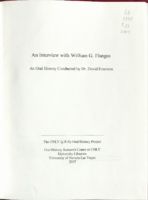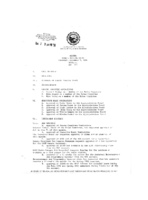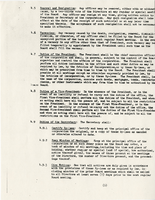Search the Special Collections and Archives Portal
Search Results
Charley Henchis Papers
Identifier
Abstract
The Charley Henchis Papers (approximately 1945-1987) document the career of international cabaret show producer Charley Henchis and the shows he produced in Las Vegas, Nevada and Beirut, Lebanon. Materials include Henchis' business files which includes correspondence, files on specialty acts, photographs, and press about Henchis. Shows represented in this collection includes
Archival Collection
Maria LaCavera Papers
Identifier
Abstract
The Maria LaCavera Papers (1947-2017) contain the papers of professional dancer Maria LaCavera. The collection documents the career of LaCavera dancing in Las Vegas, Nevada at the Flamingo Hotel in 1947, and the Last Frontier Hotel in 1949 as one of the Ramona Girls dancing in the Danny O'Neil Varieties Act. Materials include photographs of LaCavera and other Ramona Girls, newspaper clippings, correspondence, LaCavera's American Guild of Variety Artists (AGVA) employment contracts, Fabulous Las Vegas magazines, and hotel receipts. Other items of note include photographs of the 1949 Helldorado parade, a Frontier Hotel Ramona Room menu, and Frontier Hotel ephemera. There is also a copy of a self-published biography of LaCavera, written by her daughter-in-law Kristin Meyer entitled From Bon-Air to the Last Frontier. The collection also contains the digital images used to illustrate the book.
Archival Collection
Stocker Family Papers
Identifier
Abstract
The Stocker Family Papers (1860-1982) document the family’s personal, political, and business interests including Mayme Stocker’s 1931 Nevada gaming license and Harold Stocker’s involvement in the Nevada Republican party. The collection contains family correspondence, political documents and planning materials, and business records related to the family’s gaming and real estate interests.
Archival Collection
Ferron and Bracken Photograph Collection
Identifier
Abstract
The Ferron and Bracken Photograph Collection depicts Southern and Central Nevada and other western states from 1890 to 1961. The photographs primarily depict the development and growth of early Las Vegas, Nevada; mines and mining operations in Southern and Central Nevada; towns and mines in Nevada; and the Hoover (Boulder) Dam and the Colorado River.
Archival Collection
Archie C. Grant Photograph Collection
Identifier
Abstract
The Archie C. Grant Photograph Collection (1914-1968) contains black-and-white photographs of Nevada politician Archie C. Grant. The materials include photographs of Grant with the Las Vegas Housing Authority at groundbreaking ceremonies, the University of Nevada Board of Regents, and with other Nevada politicians. Materials also contain early photographs of the University of Nevada, Las Vegas campus, including the dedication of Maude Frazier Hall.
Archival Collection
Stella Champo Iaconis oral history interviews
Identifier
Abstract
Oral history interview with Stella Champo Iaconis conducted by Kay Long on May 14, 1997, May 21, 1997, May 26, 1997, and September 22, 1997 for the Women's Research Institute of Nevada (WRIN) Las Vegas Women Oral History Project. Iaconis opens her interviews discussing her difficult upbringing and life on a ranch in Las Vegas, Nevada with her dad in the 1910s and 1920s. Iaconis then describes her experiences as a waitress in Las Vegas. As the interviews continue, Iaconis discusses Block 16 and sex work, the Helldorado Days, and life in 1930s Las Vegas. Iaconis ends the interview talking about her father and his career as a miner; her many husbands; and her personal history in Las Vegas.
Archival Collection
Julia Ratti (Washoe County Health District) oral history interview conducted by Kellian Beavers and Elia Del Carmen Solano-Patricio: transcript
Date
Archival Collection
Description
From the Lincy Institute "Perspectives from the COVID-19 Pandemic" Oral History Project (MS-01178) -- Government agency interviews file.
Text

Transcript of interview with William G. Flangas by Dr. David Emerson, September 27, 2006
Date
Archival Collection
Description
Text

Meeting minutes for Consolidated Student Senate University of Nevada, Las Vegas, December 5, 1991
Date
Archival Collection
Description
Text

